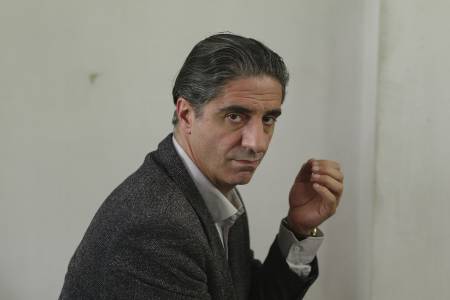-
GETT: THE TRIAL OF VIVIANE AMSALEM (Ronit and Shlomi Elkabetz 2014)
Ronit and Shlomi Elkabetz: GETT: THE TRIAL OF VIVIANE AMSALEM (2014)

SIMON ABKARIAN IN GETT
No hell like an Israeli divorce
From writer-director siblings Ronit and Shlomi Elkabetz comes their third, and from reports strongest, panel in an Israeli film trilogy about marriage made over a ten-year period. Gett: The Trial of Vivian Amsalem is a well-acted, claustrophobic and theatrical drama. It all takes place in a small courtroom or an antiroom outside it. It's a curious combination of Beckettian and Kafkaesque austerity and Italianate, operatic melodrama. It is like watching paint dry -- and then corruscate, bubble up, and burst into flames. A "gett" is a divorce document under orthodox Jewish law, and it's the only kind of divorce in Israel. It must be negotiated for in a rabbinical court, and this one, due to the stubbornness of the husband, lasts five years, with the court reconvened every few months. In the end the husband, Elisha (Simon Abkarian) only agrees to hand his wife Viviane (the Anna Magnani-esque Ronit Elkabetz) the gett after secretly gaining her promise that she will never be with another man.
By its implications Viviane Amsalem, though this time not a documentary, joins a growing number of well-made films that constitute a deep indictment of Israel today. This film reveals the country's identity as a semi-religious state. The only full citizens, after all, are Jews. And those citizens have no civic marriage or civic divorce, and the system is male-dominated: divorce here can only take place if the husband agrees. The three patriarchially oriented rabbinical judges (Eli Gorstein, Rami Danon, Roberto Pollack) make no effort to persuade Eliisha Amsalem and at the beginning of the long drawn-out affair are even reluctant to force him to appear in court when he repeatedly fails to turn up.
And what a strange courtroom this is. It's an incestuous affair. Viviane has been married to Elisha for thirty years, since she was fifteen. She and her lawyer, Carmel (Menashe Noy) maya be closer than is proper. Elisha's lawyer, who is his brother Rabbi Shimon (Sassan Gabai), accuses Carmel of being in love with Viviane; the implication is that this would disqualify him from representing her. The witnesses are neighbors and members of the synagogue. The film never ventures outside the confines of the court and its antichambers, and all we have to go on is what the participants say, and they don't seem much to be trusted. People behave unpredictably. One man refuses to leave the (tiny) courtroom when his wife is called in to testify. When Viviane or Elisha are upset it's not unusual for them to speak up, or move around the room. The three judges seem severe and disapproving: why don't they impose more order? Where are the objections of the opposing lawyers? Where are the restrictions of what witnesses may reply to questions? Perhaps the judges are following the Torah. They are not following any discernible rules of order. In this nightmare Jewish Alice in Wonderland world, it would not be surprising to learn the rabbinical judges were themselves blood relations.
Nonetheless in theatrical terms one is confident throughout of being in the best of hands, among a cast of subtle, profoundly experienced actors who know how to give every line, every lift of the eyebrow, a precise and pointed meaning. Ronit Elkabetz and Simon Abkarian are masterful in their ability to work the camera. Abkarian is French (the implication seems to be that Elisha and Viviane are Moroccan Jews) and more often than not he speaks French, not the language of the proceedings, Hebrew. Attention is given to the linguistic peculiarities of the various speakers, and the occasional Arabic dialect word of phrase is sometimes slipped in. The camerawork is fine, the dp, Jeanne Lapoirie (who shot Eastern Boys), a particularly essential player in the claustrophobic game. Her focus is sometimes so much on the reactions of the principals that it detracts from coverage of the proceedings; but that's true to the nature of the courtroom, which seems to privilege whim over justice. You may find Viviane Amsalem frequently funny, but the whole business is so oppressive and depressing in its implications it may be hard to laugh.This is a tightly wound, powerful construction, masterful in its use of telling little visual touches, but sometimes it teases out its effects too long. One walks out of the nearly two-hour film impressed, appalled, moved, and exhausted.
Gett: The Trial of Viviane Amsalem, 116 mins., debuted at Cannes (Directors Fortnight) and also at Toronto, other festivals. It opened in France 25 June 2014 to excellent reviews (AlloCiné press rating 4.0). Note what the Cahiers du Cinéma critic wrote: "In its way of perpetually oscillating between comedy and drama, between Kafka and Italian comedy, this last panel in Ronit and Shimon Elkabetz's trilogy, assuredly the most convincing, expresses profound anxiety about the future of the country." This was Israel's submission for the 2015 Best Foreign Oscar (but not in the shortlist). Currently showing (8 February 2015) at the JCC/Israel Film Center in NYC, its release by Music Box Films begins at Lincoln Plaza Cinema and in Los Angeles (Royal) 13 February.
Last edited by Chris Knipp; 02-13-2015 at 07:39 PM.
 Posting Permissions
Posting Permissions
- You may not post new threads
- You may not post replies
- You may not post attachments
- You may not edit your posts
-
Forum Rules





 Reply With Quote
Reply With Quote
Bookmarks